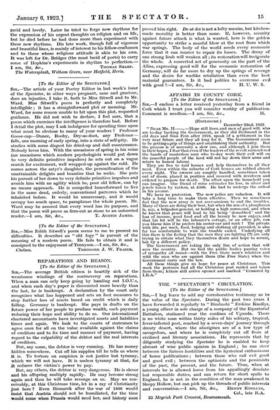[To the Editor of the SPECTATOR.] Sm,—The article of your
Poetry Editor in last week's issue of the Spectator, in other ways pregnant, sane and gracious, does an injustice, I take it, both to Miss Sitwell and to Mr. Ward. Miss Sitwell's poem is perfectly and completely intelligible ; it has a straightforward plot or meaning. Mr. Ward, for some reason unable to hit upon this plot, requested guidance. He did not wish to declare, I feel sure, that a poem which exercises the intelligence is therefore bad. Before I detail the plot, may I ask indulgence for spending time upon what must be obvious to many of your readers ? Professor Goose-cap—Dunce, Booby, Dry-as-dust, any Professor— falls, one morning of early spring, into a state of self-pity. He studies with some disgust his dried-up and dull countenance. Nobody loves him. With the uneasiness of spring in his veins (an uneasiness which modern psychologists would put down to very definite primitive impulses) he sets out on a vague search for excitement, well wrapped-up against the cold. He comes across the satyr's daughter, the personification of the unattainable delights and beauties that he seeks. She puts his pursuit of her down to very definite primitive impulses and avoids him with an agility which he, poor old fellow, can by no means approach. He is compelled henceforward to live in the same dead, orderly, conventional parterres which he inhabited before. It would be unnecessary, and it would occupy too much space, to paraphrase the whole poem. Mr. Ward may be assured that every word has its purpose, and that the poem will prove as firm-cut as stone to an unhurried


















































 Previous page
Previous page